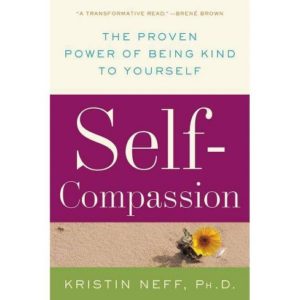In her first book, Self-Compassion: The Proven Power of Being Kind to Yourself, Kristin Neff, associate professor at the University of Texas at Austin, teaches us how to open our minds and hearts to develop a lasting and authentic sense of compassion for ourselves.
How does the practice of Self-Compassion influence human suffering and pain? To what extent can the mind impinge on our emotional and physical well-being? How can I begin to act out from compassion and kindness? Kristin Neff, a pioneer in this field of research, offers powerful insights that expand the notion of Self-Compassion and its capacity to transform lives.
According to the findings of the author and specialists, when people decide to be self-compassionate they can improve aspects of essential importance, such as self-love, emotional intelligence, personal relationships, motivation, feelings of competence and performance, parenting, sexuality, among others.
And the fact is that, a mind trained from compassion and kindness will be in a better position to manage our imperfections, weaknesses and sorrows.
What is Self-Compassion?

Kristin Neff introduces the concept of Self-Compassion as a kind and understanding attitude towards the “self” in times of suffering, personal failure, or emotional pain. The doctor of psychology explains that Self-Compassion consists of being kind and gentle in the face of personal mistakes or inadequacies, instead of attacking oneself with cruelty and succumbing to self-flagellation.
Self-compassion has the same characteristics as compassion for others. It requires, essentially, that we become aware of our own suffering and do what we can to alleviate it. The problem arises because most people tend to minimize their own pain, as if it were a feeling that does not deserve attention or a compassionate response.
Are you as kind to yourself as you are to others?
In its most basic form, Self-Compassion consists of treating yourself with the same kindness and gentleness with which you would treat friends and family members when they are suffering, failing or feeling incompetent. It is enough to stop and think: What would I say to someone close if they were going through a conflict similar to mine? Instead of focusing exclusively on our “own” point of view, we would adopt the perspective of “someone else” towards ourselves. In this way, we would contemplate the distressing event just as a friend, a father or a mother would.
To err is human thing, we all know that. However, when we make mistakes or fail in some purpose, we usually do not feel empathy for ourselves, nor for our suffering. Most of us get stuck in a behavior of self-criticism, hostility and personal disqualification. Often, the inner monologue becomes a brutal and dangerous trap that repeats incessantly: “All you say is stupid”, “You are a failure”, “You will never amount to anything”, “What the hell were you thinking?”, “I don’t know what I was born for”, “I am unworthy of being loved”.
However, if we were to meet a friend in an unfortunate situation, we would most likely automatically offer support, understanding, and kindness. Moved by the pain of someone close to us, we would do what we could to alleviate the dissatisfaction or discomfort that afflicts them. That is what Self-Compassion is all about, giving ourselves the same comfort that we would naturally give to those facing a difficult event.
Self-compassionate people deliberately choose to soothe and comfort themselves when external life circumstances make them feel overburdened, frightened, embarrassed, humiliated, or incompetent.
Self-compassionate people deliberately choose to soothe and comfort themselves when external life circumstances make them feel overburdened, frightened, embarrassed, humiliated, or incompetent. Instead of self-criticism and self-degradation, practitioners of Self-Compassion offer themselves support, warmth, solidarity, empathy, encouragement, patience and, above all, unconditional acceptance.
In this sense, the author provides us with knowledge, emotional resources, and exercises to heal the mind and minimize destructive self-judgment. Kindness to oneself is actually a skill that can be fostered and cultivated, even if people have been attacking themselves with self-criticism for years.
Beliefs that affect the practice of Self-Compassion
In Western culture, a false belief has taken root that Self-Compassion is a form of feeling sorry for oneself and giving up. Some people worry that kindness, tolerance, and gentleness toward the “self” may lead to self-indulgent behavior, which undermines motivation. However, research by Kristin Neff and other leading psychologists indicates that individuals who are compassionate in the face of their frustrations and imperfections enjoy a greater sense of well-being than those who are fiercely self-judgmental.
The book demonstrates that being kind to oneself is closely associated with overall well-being. In this respect, being self-compassionate can reduce ruminative thoughts, stress, depression, narcissism, performance anxiety, and life dissatisfaction. It can also lead to increased happiness, optimism, social connectedness, and self-confidence.

The Three Components of Self-Compassion
According to Kristine Neff’s conceptualization, Self-Compassion has three main elements: 1) self-kindness, 2) common humanity, and 3) mindfulness. These components combine and interact with each other to create a self-compassionate state of mind.
Self-kindness vs. Self-judgment: Be kind and understanding with oneself, instead of being self-critical
Kindness to oneself involves having a warm and supportive attitude when we make mistakes, suffer, stumble, or feel disappointed. Instead of mistreating and belittling ourselves when we fail in some endeavor, the idea is mainly to validate our emotions (our weaknesses and failures) and consciously minimize devastating criticism. Self-kindness also means taking a pause to ease the pain.
In a way, it is as if we give ourselves permission to appease destructive self-judgment and instead focus on actively encouraging, comforting, and cheering ourselves on.
Change the self-critical inner monologue into a compassionate one
People who are trained in self-compassion are able to recognize that being imperfect and experiencing difficulties in life are inevitable situations. Life is like that and that is why it is so necessary and useful to learn to relate to pain in a more compassionate and healthy way.
Through a genuine feeling of caring and kindness towards oneself, painful experiences become bearable. One of the most important ways to be kind to oneself is to change the self-critical inner monologue into a compassionate one.
Common humanity vs. Isolation: To perceive one’s own suffering as part of a broader human experience, rather than isolating or self-absorbed
The author suggests that common humanity can be understood as the awareness that suffering is part of each person’s life.
All human beings have experienced pain and suffering, even affluent individuals, individuals in enviable health, individuals in the prime of youth, or those with a brilliant mind. Self-compassion helps us to understand and internalize that suffering and a “sense of personal inadequacy” are part of the common human experience. It is a reality that absolutely all of us face, rather than an isolated reality that only happens “to me”.
It has been shown that when a complex experience is accompanied by the recognition that many people go through similar situations, the bitter pill is more bearable. Although the damage may persist for some time, the important thing is that it is not aggravated by feelings of isolation. In short, we are human, we start from the same genetic base, we share both conflicting emotions and the same potential for inner strength.
Mindfulness vs. Over-identification: Holding painful feelings and thoughts in a conscious mind, rather than avoiding or over-identifying with them
The third component of Self-Compassion, according to the psychologist and professor at the University of Texas, is Mindfulness. This is a receptive and non-judgmental state of mind in which feelings are observed as they are. Instead of resisting or avoiding suffering, we orient ourselves toward it with a balanced and gentle awareness. Mindfulness helps us to face the truth of our experience, while helping us to calm down.
“Mindfulness brings us back to the present moment and provides the type of balanced awareness that forms the foundation of self-compassion. Like a clear, still pool without ripples, mindfulness perfectly mirrors what’s occurring without distortion. Rather than becoming lost in our own personal soap opera, mindfulness allows us to view our situation with greater perspective and helps to ensure that we don’t suffer unnecessarily”, expresses the author in a revealing passage.
Very soon, the reader will discover that Self-Compassion is not an unattainable practice reserved for a select few, but is a skill that can be learned with a little perseverance and determination.
An enlightening read
In short, Self- Compassion: The Proven Power of Being Kind to Yourself provides lessons, exercises, and examples aimed at improving the way we relate to ourselves when facing disillusion, bad times, existential dilemmas, or disappointing experiences. This deeply personal and enlightening publication teaches readers an alternative path that leads to emotional healing, serenity, and inner transformation.
Image credits: NappyStock and shanalovecoaching

